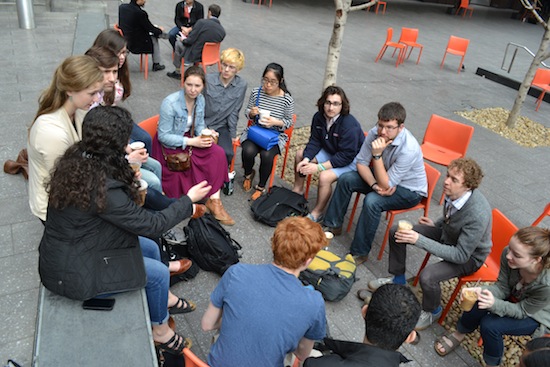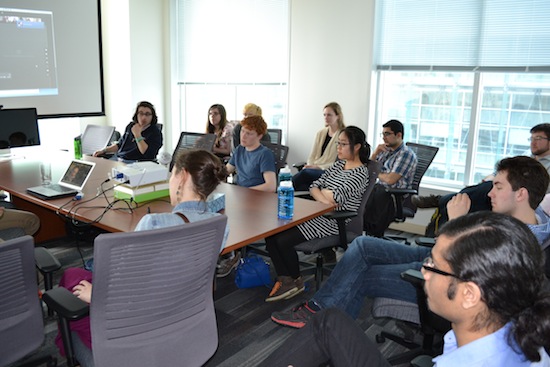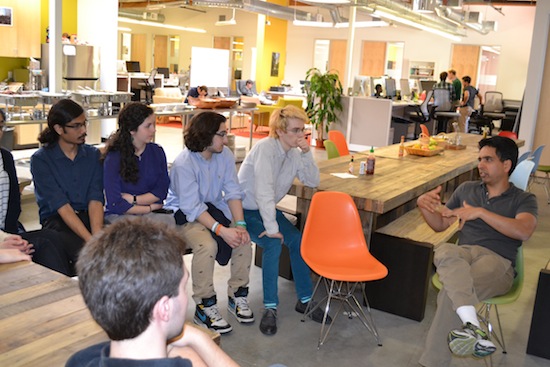
in San Francisco
This post originally appeared on the . Last month, the Benton Scholars traveled to San Francisco to explore innovation in the education and technology sectors. The trip included visits to Khan Academy, Tesla, and the Minerva Project. Guo, who had been accepted to attend the highly selective and innovative Minerva School but chose łÉČËÍ·Ěő instead, reflects on the trip and her college choice. (A longer version of this post is featured at .)
On the ninth floor overlooking the busy San Francisco downtown, everyone is working on Macs in open-plan stations — the atmosphere feels like any startup in California.
But I am in a school, with no students in sight — Minerva Schools at KGI, a new institution that hopes to shake the whole education sector.
Over spring break, I traveled with an online education-themed Benton trip to San Francisco, where we visited both Minerva and Khan Academy.
The Benton seminar I am taking this semester is called the , which examines the history, science, and ethics behind . My experience had been, so far, bittersweet. While it is interesting and intellectually stimulating to engage with alumni from all age groups and various walks of life online, the workload is heavier. Besides the normal assigned readings and project-based homework offline, we need to watch the lectures online beforehand because class-time is reserved for advanced discussion. So we are expected to master the basics on our own time. This targeted and technology-enhanced blend is challenging and rigorous — it is the way I want to be pushed.

Benton Scholars listen to a presentation at Minerva in downtown San Francisco.
To me, Minerva is exciting. However, while living in six countries (students at Minerva live in a new city each semester) and being one of a select few has allure (last year, the acceptance rate was only 2.8%), I question the real meaning behind it. Does being physically present in a country, spending most of your time taking online classes in dorms, while going shopping and sightseeing on weekends, equate to immersion in a foreign culture? Aren’t existing , which allow students to take classes in local universities and live in host families, more authentic? For affordability, at least łÉČËÍ·Ěő subsidizes all expenses for students receiving financial aid. Similarly with diversity: Does having a higher number of international students necessarily mean more different perspectives? At Minerva, one can definitely take advantage of urban resources; but how can you truly make use of it in Berlin if you can’t speak German, or Barcelona if you can’t speak Spanish?
Then there was Sal Khan, who sat on an organic-style stool at Khan Academy, talking about how he started making tutorials to improve the accessibility of new information. Thanks to people like Sal Khan, information is becoming more freely accessible, so class time can be reserved for engaged and deeper-level discussions, for skill development and real-life interaction. And I really appreciate how łÉČËÍ·Ěő, too, can offer that — all with classes of size no more than 20.

Benton Scholars meet with Sal Khan to discuss the future of online education.
When we discussed and shared views over a cup of coffee in the afternoon sun, I realized that what I value after nearly a year at łÉČËÍ·Ěő is the sense of connection. Personally, I hate the panic when my computer breaks down and an online submission is due soon. Also, I don’t want to just “like” my classmate’s answer by clicking a button. I want to give him a pat or high-five with a wide grin. Most importantly, I treasure how my professors interact with me, not just in class or office hours, but how they share with me their life stories over home-cooked dinner, after guests’ lectures, and during trips like this one.
I don’t think that brick-and-mortar universities will be obsolete soon, but it [sic] can definitely become better. Technology is never a substitute, but a complement to make things better.
Read more from other .
